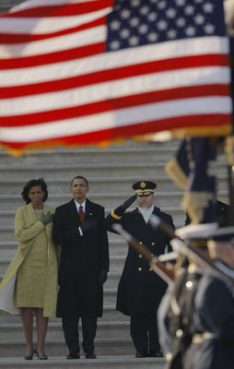
(RNS6-JAN20) President Barack and Michelle Obama and Maj. Gen. Richard Row “review the troops” after Obama’s inauguration on Tuesday. For use with RNS-OBAMA-SPEECH and RNS-OBAMA-PRAYER, transmitted Jan. 20, 2009. Religion News Service photo by John Munson/The Star-Ledger.
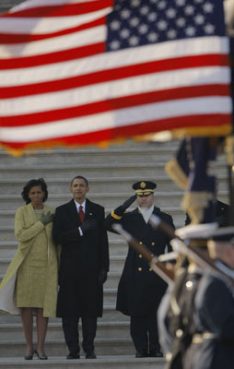
(RNS6-JAN20) President Barack and Michelle Obama and Maj. Gen. Richard Row “review the troops” after Obama’s inauguration on Tuesday. For use with RNS-OBAMA-SPEECH and RNS-OBAMA-PRAYER, transmitted Jan. 20, 2009. Religion News Service photo by John Munson/The Star-Ledger.
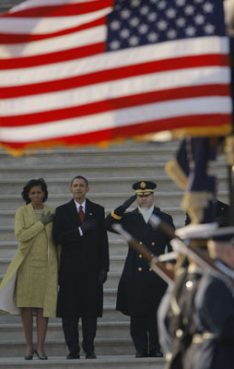
(RNS6-JAN20) President Barack and Michelle Obama and Maj. Gen. Richard Row “review the troops” after Obama’s inauguration on Tuesday. For use with RNS-OBAMA-SPEECH and RNS-OBAMA-PRAYER, transmitted Jan. 20, 2009. Religion News Service photo by John Munson/The Star-Ledger.
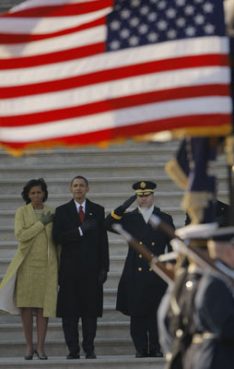
(RNS6-JAN20) President Barack and Michelle Obama and Maj. Gen. Richard Row “review the troops” after Obama’s inauguration on Tuesday. For use with RNS-OBAMA-SPEECH and RNS-OBAMA-PRAYER, transmitted Jan. 20, 2009. Religion News Service photo by John Munson/The Star-Ledger.
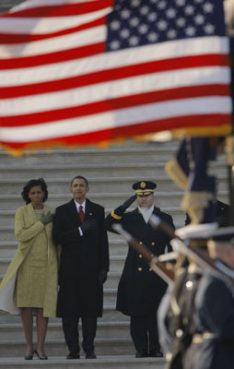
(RNS6-JAN20) President Barack and Michelle Obama and Maj. Gen. Richard Row “review the troops” after Obama’s inauguration on Tuesday. For use with RNS-OBAMA-SPEECH and RNS-OBAMA-PRAYER, transmitted Jan. 20, 2009. Religion News Service photo by John Munson/The Star-Ledger.
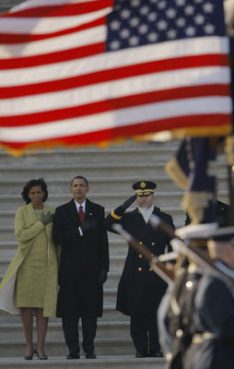
(RNS6-JAN20) President Barack and Michelle Obama and Maj. Gen. Richard Row “review the troops” after Obama’s inauguration on Tuesday. For use with RNS-OBAMA-SPEECH and RNS-OBAMA-PRAYER, transmitted Jan. 20, 2009. Religion News Service photo by John Munson/The Star-Ledger.
WASHINGTON-Seeking to revive a dispirited nation, President Obama on Tuesday (Jan. 20) told Americans to get religion-civil religion.
“We remain a young nation, but in the words of Scripture, the time has come to set aside childish things,” Obama said, quoting St. Paul’s first letter to the Corinthians, in one of the few explicitly Christian references in his address.
Although at times Obama adopted the cadences of the black church that he called home for 20 years, he borrowed little of its content.
Instead, Obama’s inaugural address, like that of previous presidents, drew heavily on what scholars deem America’s civil religion: the transcendent ideals laid out in the Declaration of Independence and other foundational documents.
Those ideals are often assumed-but not always said-to be divinely inspired or granted. On Tuesday, Obama seemed to channel the spirit of President John F. Kennedy, who reminded a nation in 1961 that “the rights of man come not from the genorosity of the state but from the hand of God.”
“The time has come to reaffirm our enduring spirit,” Obama said, “to choose our better history; to carry forward that precious gift, that noble idea passed on from generation to generation: the God-given promise that all are equal, all are free, and all deserve a chance to pursue their full measure of happiness.”
America’s civil religion has been a fixture at inaugural ceremonies since George Washington’s, when the peaceful transfer of power at the high altar of American politics takes on an almost sacred air. Obama drew on Washington and other American icons as exemplars of banding together for the common good, a key tenet of civil religion.
“Throughout his speech he is challenging us to be `We the people,”‘ said the Rev. Cheryl Townsend Gilkes, professor of African-American studies at Colby College in Maine.
But Obama’s unique personal history and the perils of the present moment added new elements to America’s old time religion, said Martin E. Marty, the religion scholar and former professor at the University of Chicago Divinity School.
“In talking about civil religion, you make a great deal of the power of the nation to do things,” Marty said. On Tuesday, “there was a twist; it wasn’t that the nation is perfect … but that we have failed to live up to our ideals.”
Author and religion scholar Diana Butler Bass said the speech’s strain of modesty was a break from the past.
“This is very different from what you would have heard in the civil religion of the 1950s, which was a more jubilant exultation of American rightness, that we’re a chosen people,” Bass said. `This speech had much more of a `We’re an almost-chosen people.’ This is the kind of civil religion that Lincoln is famous for.”
The speech was also, she said, a classic example of the liberal Protestant tradition that Obama embraced through the United Church of Christ, a view of “an American future that is based on humility and inclusion rather than triumph and elitism.”
Though Obama said American ideals “still light the world,” he suggested they’ve been hidden under a bushel as the government tried to keep its citizens safe from terrorist attacks. American beliefs-particularly tolerance and diversity-are more effective than American bullets in fighting terrorists, Obama said.
“For we know that our patchwork heritage is a strength, not a weakness. We are a nation of Christians and Muslims, Jews and Hindus-and non-believers,” he said.
Despite a handful of overt religious references, Obama’s nod to “non-believers” reflected the journey of a man whose parents were religious doubters, who didn’t find faith until he was an adult, and whose extended family practices diverse religions.
“The fact that he mentioned non-believers leads me to think that he is cognizant of not leaving us out,” said Lori Lipman Brown, director of the Secular Coalition of America.
Brown was also heartened at Obama’s pledge to “restore science to its rightful place,” a veiled reference to criticism that religious ideology trumped research during the Bush administration-especially in the field of bioethics.
In a further break with his predecessor, Obama told “the Muslim world” that “we seek a new way forward, based on mutual interest and mutual respect.”
Still, the bulk of Obama’s speech was addressed to Americans. The challenges may be new, he said, but the “values on which our success depends … are old.”
“This is the source of our confidence,” the new president said, “the knowledge that God calls on us to shape an uncertain destiny.”




